| Srl | Item |
| 1 |
ID:
133600
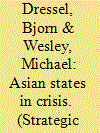

|
|
|
|
|
| Publication |
2014.
|
| Summary/Abstract |
Problems common to many Asian states suggest a pattern of crisis in Asia. The evidence suggests that the root cause is the similarity in the patterns of political development of postcolonial states. In Asia such states have attempted to reconcile state strength and internal diversity by constructing a triangular balance between identity construction, hegemonic governance and economic development. Unfortunately, this fragile balance eroded as state structures matured and economies grew, which increasingly exposed countries to escalating crises of legitimacy and instability. By highlighting changes in the postcolonial state compact within the region, this article seeks to advance both the understanding among theorists of political developments in the region and the understanding among those who govern of the roots of the current crisis.
|
|
|
|
|
|
|
|
|
|
|
|
|
|
|
|
| 2 |
ID:
123649
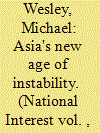

|
|
|
| 3 |
ID:
098402
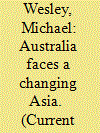

|
|
|
|
|
| Publication |
2010.
|
| Summary/Abstract |
Tensions between Australia's strategic alignment and its economic alignment . . . heighten Canberra's anxieties about having to choose between security and prosperity in the event of a confrontation between the United States and China.
|
|
|
|
|
|
|
|
|
|
|
|
|
|
|
|
| 4 |
ID:
022102


|
|
|
|
|
| Publication |
July 2002.
|
| Description |
207-222
|
| Summary/Abstract |
This article critically examines the argument that the forces of globalisation will see the end of the foreign ministry in the context of Australia's Department of Foreign Affairs and Trade (DFAT). It suggests that globalisation is affecting the subject matter of foreign policy-making through four processes: diffusion, enmeshment, contradiction, and transformation. It then looks at three prominent challenges these processes have made to the work of DFAT: politicisation; the volume and contestation of information; and resource-cutting. It concludes that rather than being eroded by globalisation, DFAT has been forced to play a more assertive and diversified role, and that it has responded to these challenges in a highly creative way.
|
|
|
|
|
|
|
|
|
|
|
|
|
|
|
|
| 5 |
ID:
048683


|
|
|
|
|
| Publication |
London, Macmillan, 1997.
|
| Description |
xi, 200p.
|
| Standard Number |
0333682440
|
|
|
|
|
|
|
|
|
|
|
|
Copies: C:1/I:0,R:0,Q:0
Circulation
| Accession# | Call# | Current Location | Status | Policy | Location |
| 039126 | 341.584/WES 039126 | Main | On Shelf | General | |
|
|
|
|
| 6 |
ID:
075942
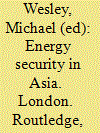

|
|
|
|
|
| Publication |
London, Routledge, 2007.
|
| Description |
xi, 251p.
|
| Standard Number |
0415410061
|
|
|
|
|
|
|
|
|
|
|
|
Copies: C:1/I:0,R:0,Q:0
Circulation
| Accession# | Call# | Current Location | Status | Policy | Location |
| 052156 | 333.79095/WES 052156 | Main | On Shelf | General | |
|
|
|
|
| 7 |
ID:
175921


|
|
|
|
|
| Publication |
Sydney, Australian Broadcasting Corporation, 2007.
|
| Description |
viii, 264p.Pbk
|
| Standard Number |
978073332078
|
|
|
|
|
|
|
|
|
|
|
|
Copies: C:1/I:0,R:0,Q:0
Circulation
| Accession# | Call# | Current Location | Status | Policy | Location |
| 059930 | 327.940509049/WES 059930 | Main | On Shelf | General | |
|
|
|
|
| 8 |
ID:
065105
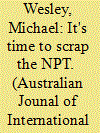

|
|
|
| 9 |
ID:
083827


|
|
|
|
|
| Publication |
2008.
|
| Summary/Abstract |
From Sierra Leone to Solomon Islands, developed powers have undertaken a range of state-building interventions in the early years of this century. Two influences appear to shape the emerging state of the art on state building: conceptions about the nature of the state in the developed world; and the postcolonial sensitivities and practicalities that attend the project of intervention. After examining the imperatives driving interventions in fragile states, I explore the remarkable consistency among approaches to state building applied by different states and coalitions in different contexts. I then examine the imperatives driving this convergence of approaches and conclude with some observations tracing the difficulties of contemporary interventions to the current dominant approach to state building
|
|
|
|
|
|
|
|
|
|
|
|
|
|
|
|
| 10 |
ID:
082369


|
|
|
|
|
| Publication |
2008.
|
| Summary/Abstract |
Most analysts agree that the recent proliferation of Preferential Trade Agreements (PTAs) is largely the result of exasperation with multilateral trade liberalisation through the World Trade Organisation and a defensive response to the large-scale adoption of PTAs by major economies. The spread of PTAs, however, suggests that there are motivations other than economic that are inspiring these trade deals. It is becoming increasingly obvious that the use of PTAs to gain or reinforce strategic benefits, or to forestall strategic disadvantage, has been a major but largely unacknowledged driver of the recent trend towards PTAs. Three profound shifts in the international system over the past 15 years have led to the declining utility of traditional security institutions and thus the search for new forms of strategic deal-making: an enduring crisis of security institutions; the rise of new great powers; and the arrival of non-state security threats. In response, both large and small powers have resorted to a range of instruments, including strategically-driven PTAs
|
|
|
|
|
|
|
|
|
|
|
|
|
|
|
|
| 11 |
ID:
140719
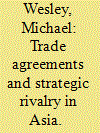

|
|
|
|
|
| Summary/Abstract |
The Asia Pacific is currently beset by two contradictory trends: growing economic interdependence and deepening strategic rivalry. Amidst these trends, new sets of regional trade agreements are being negotiated, primarily the Trans-Pacific Partnership (TPP) and the Regional Comprehensive Economic Partnership (RCEP). This article argues that these proposals represent a third phase of competitive regionalism in the Asia Pacific, which will be more complex than the previous two rounds. This complexity is driven by two factors: this time, rivalry is not over scope or leadership but regional order; and this time there is a greater number of leading players in the rivalry.
|
|
|
|
|
|
|
|
|
|
|
|
|
|
|
|